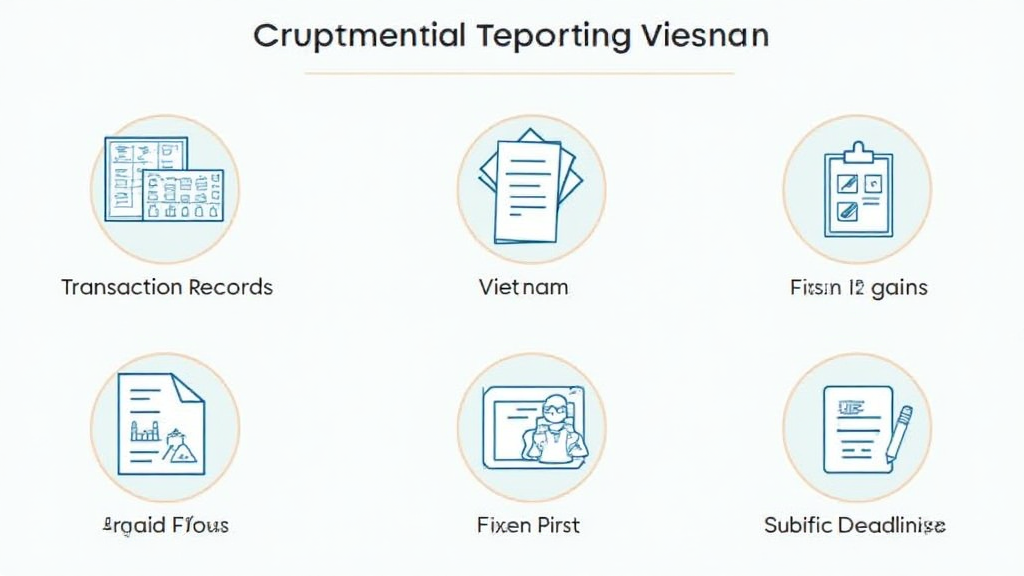Comprehensive Guide to Cryptocurrency Tax Reporting in Vietnam
As the world of digital currencies evolves at a rapid pace, many individuals and businesses in Vietnam are becoming increasingly involved in cryptocurrency trading and investment. In fact, over 5 million users in Vietnam have engaged in cryptocurrency activities, making it one of the most vibrant markets in Southeast Asia. However, with this growing interest comes the need for cryptocurrency tax reporting. Understanding the tax obligations associated with cryptocurrency can save investors from potential pitfalls and ensure compliance with local regulations.
In this article, we will explore the critical aspects of cryptocurrency tax reporting in Vietnam, along with best practices, relevant regulations, and practical tips to help you navigate this complex landscape.
Understanding Cryptocurrency Taxation in Vietnam
Before diving into the intricacies of tax reporting, it’s important to understand how cryptocurrencies are classified and taxed under Vietnamese law. As of 2023, the Vietnamese government considers cryptocurrencies as assets rather than traditional currencies. This classification implies that transactions involving cryptocurrencies may be subject to capital gains tax.

According to information from the Ministry of Finance, any profit generated from cryptocurrency trading is subject to a tax rate of 20%. This includes the sale of cryptocurrencies for fiat currency, exchange between different cryptocurrencies, and even the acceptance of cryptocurrency as payment for goods or services.
Key Guidelines for Cryptocurrency Tax Reporting
Navigating cryptocurrency tax reporting requires a systematic approach to ensure compliance and avoid legal complications. Here are some essential guidelines:
- Maintain Detailed Records: Keep track of all your cryptocurrency transactions, including dates, amounts, trading partners, and the purpose of each transaction. This documentation will be crucial during tax reporting.
- Calculate Capital Gains: The gain from a transaction is the difference between the selling price and the purchase price. Ensure that you accurately calculate and report any capital gains.
- Use Reliable Software Tools: Several tools can help automate the process of tracking and reporting cryptocurrency transactions. For instance, tools like CoinTracking and Koinly can simplify your record-keeping.
Filing Your Cryptocurrency Taxes
In Vietnam, taxpayers must file their income tax returns annually, which includes reporting any gains from cryptocurrency transactions. Here’s how to approach the filing process:
- Understand Filing Deadlines: Tax returns in Vietnam are typically due by March 31st each year. Ensure that you submit your return on time to avoid penalties.
- Seek Professional Assistance: Given the complexities of cryptocurrency tax laws, consider hiring a tax consultant familiar with the industry. They can provide valuable insights and ensure compliance with local laws.
- Double-check Your Calculations: Mistakes in capital gains calculations can lead to significant penalties. Always review your figures before submission.
Common Mistakes to Avoid in Cryptocurrency Tax Reporting
Many taxpayers, especially novices, make common mistakes when reporting their cryptocurrency transactions. Here are some pitfalls to avoid:
- Neglecting to Report All Transactions: All cryptocurrency trading activities must be reported, including those that resulted in losses.
- Filing Late: Avoid delays in filing your returns. Late submissions can incur fines and interest payments on owed taxes.
- Incorrectly Classifying Transactions: Misclassifying what type of transaction has occurred (e.g., distinguishing between trading and investing) can lead to tax complications.
Future Trends in Cryptocurrency Taxation in Vietnam
As the cryptocurrency landscape continues to change, so too will the regulatory environment in Vietnam. It is anticipated that:
- Increased Regulation: Expect more structured guidelines and regulations regarding cryptocurrency by 2025, including clearer definitions of taxable events.
- Technological Adaptation: The government may develop more software to aid in tax collection from cryptocurrency transactions.
- Public Awareness Campaigns: Awareness about cryptocurrency taxation is likely to rise as more individuals enter the market.
In conclusion, understanding cryptocurrency tax reporting in Vietnam is vital for anyone engaged in crypto activities. By staying informed about regulations, maintaining accurate records, and seeking professional assistance when needed, you can navigate this complex area with confidence.
For further information on cryptocurrency regulations and practices in Vietnam, you can visit hibt.com, where you will find resources to help you stay up to date with the latest developments.
As we look towards the future of cryptocurrency taxation in Vietnam, it is crucial to remain proactive and informed. This dynamic market presents opportunities and challenges, but with the right knowledge and tools, you can ensure proper compliance and maximize your returns in the world of cryptocurrency.
Remember, this article is for informational purposes only and not financial advice. Always consult with your local tax authorities for the most accurate guidance regarding your specific tax obligations.
Written by Dr. Nguyen Minh Tu, a prominent tax consultant with over 10 years of experience in financial regulations, having published 20 papers in top-tier finance journals.







